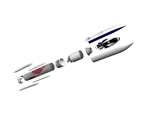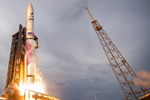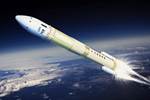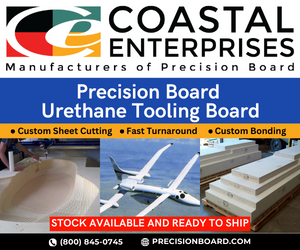ULA Vulcan rocket progresses closer to launch
The company’s first Vulcan Cert-1 rocket is complete and is headed to its launch site for flight readiness verification tests.

Cert-1 rocket on the launch pad. Photo Credit: United Launch Alliance (ULA)
The United Launch Alliance’s (ULA, Centennial, Colo., U.S.) Vulcan Centaur rocket has begun its journey to the launch site in preparation for the first test flight. The certification flight one (Cert-1) rocket was completed, loaded onto the company’s R/S RocketShip (a cargo ship) outside of ULA’s rocket factory in Decatur, Alabama, and is on a 2,000-mile voyage to Cape Canaveral Space Force Station in Florida.
“The first Vulcan is complete, and we look forward to the test flight this year. Vulcan is a powerful rocket with a single core booster that is scalable for all missions including heavy class performance normally requiring a Delta IV Heavy configuration,” Tory Bruno, ULA’s president and CEO, says. “Vulcan provides higher performance and greater affordability while continuing to deliver our unmatched reliability and orbital precision for all our customers across the national security, civil and commercial markets.”
Once the R/S RocketShip arrives in Cape Canaveral, the Vulcan hardware will be transferred to ULA facilities for inspections and processing ahead of launch preparations. The rockt will undergo a series of flight readiness verification tests including multiple tanking tests and a wet dress rehearsal, culminating in an engine flight readiness firing. Following the successful final testing, the payloads will be integrated, and the vehicle will be readied for launch.
“The ULA team has worked tirelessly to complete the rocket for the first certification flight,” Mark Peller, vice president of Vulcan development, adds. “Now that production is complete, our launch team will begin processing and testing this innovative new rocket in preparation for the first mission which will deliver a payload to the moon.”
Related Content
-
Airborne delivers composite upper stage tank for EU ENVOL project
Nine-member consortium targets development of low-cost, green vertical orbital launcher with manufacture of an ultra-lightweight composite tank design in an automated manufacturing environment.
-
NASA launches composite solar sail into space
Sunlight-based propulsion system, supported by carbon fiber-reinforced booms, will undergo weeks-long testing to demonstrate and verify its capabilities.
-
Carbon fiber satellite arm reduces weight, simplifies assembly onto naval vessels
Satcom developer EM Solutions partnered with ACS Australia to replace an aluminum arm design with a 65% lighter, one-piece, corrosion-resistant carbon fiber/epoxy alternative.













